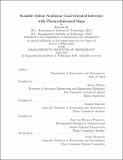Scalable online nonlinear goal-oriented inference with physics-informed maps
Author(s)
Li, Harriet.
Download1119667655-MIT.pdf (2.569Mb)
Other Contributors
Massachusetts Institute of Technology. Department of Aeronautics and Astronautics.
Advisor
Karen Willcox.
Terms of use
Metadata
Show full item recordAbstract
This thesis develops a physics-informed k-nearest neighbors approach, which draws from both physics-based modeling and data-driven machine learning. In doing so, our method achieves robustness and increased accuracy with small datasets, while being cheap to apply. Our method tackles the challenges of high-dimensional inverse problems governed by complex physical models. Such inverse problems arise in important engineering applications, such as heat transfer, medical and structural imaging, and contaminant control. In particular, we consider the goal-oriented inverse problem setting, where unknown model parameters are inferred from observations in order to calculate some low-dimensional quantity of interest (QoI). When computational resources and/or time are limited, it is infeasible to solve the full inverse problem for inferred parameters to obtain the QoI. This thesis describes an algorithm that bypasses solving the inverse problem, instead directly giving rapid QoI estimates for observations. We generate a library of physics-informed maps based on local approximations to the goal-oriented inverse problem. Applying tensor decompositions to these approximate problems gives compact multilinear physics-informed maps. These maps are calculated and stored in an offline preparatory phase, and then applied to online observations to give rapid QoI estimates. This thesis also describes tailored active learning algorithms, which efficiently choose training points in observation space at which to generate these physics-informed maps. This improves the online prediction performance given a limited offline computational and/or storage budget. We demonstrate our rapid QoI estimation and active learning algorithms on a quality-control problem for additive manufacturing. The proposed physics-informed approach achieves 5% relative QoI error in 0.1% of the time to solve the full inverse problem. Our physics-informed mappings give a third of the QoI estimate error that black-box regression methods do for small datasets, and are more robust when the offline dataset does not well represent the online test points. The tailored active learning algorithms produce datasets that reduce maximum QoI error by 25% and misclassification by 15%, compared to randomly chosen datasets.
Description
This electronic version was submitted by the student author. The certified thesis is available in the Institute Archives and Special Collections. Thesis: Ph. D., Massachusetts Institute of Technology, Department of Aeronautics and Astronautics, 2019 Cataloged from student-submitted PDF version of thesis. Includes bibliographical references (pages 103-114).
Date issued
2019Department
Massachusetts Institute of Technology. Department of Aeronautics and AstronauticsPublisher
Massachusetts Institute of Technology
Keywords
Aeronautics and Astronautics.